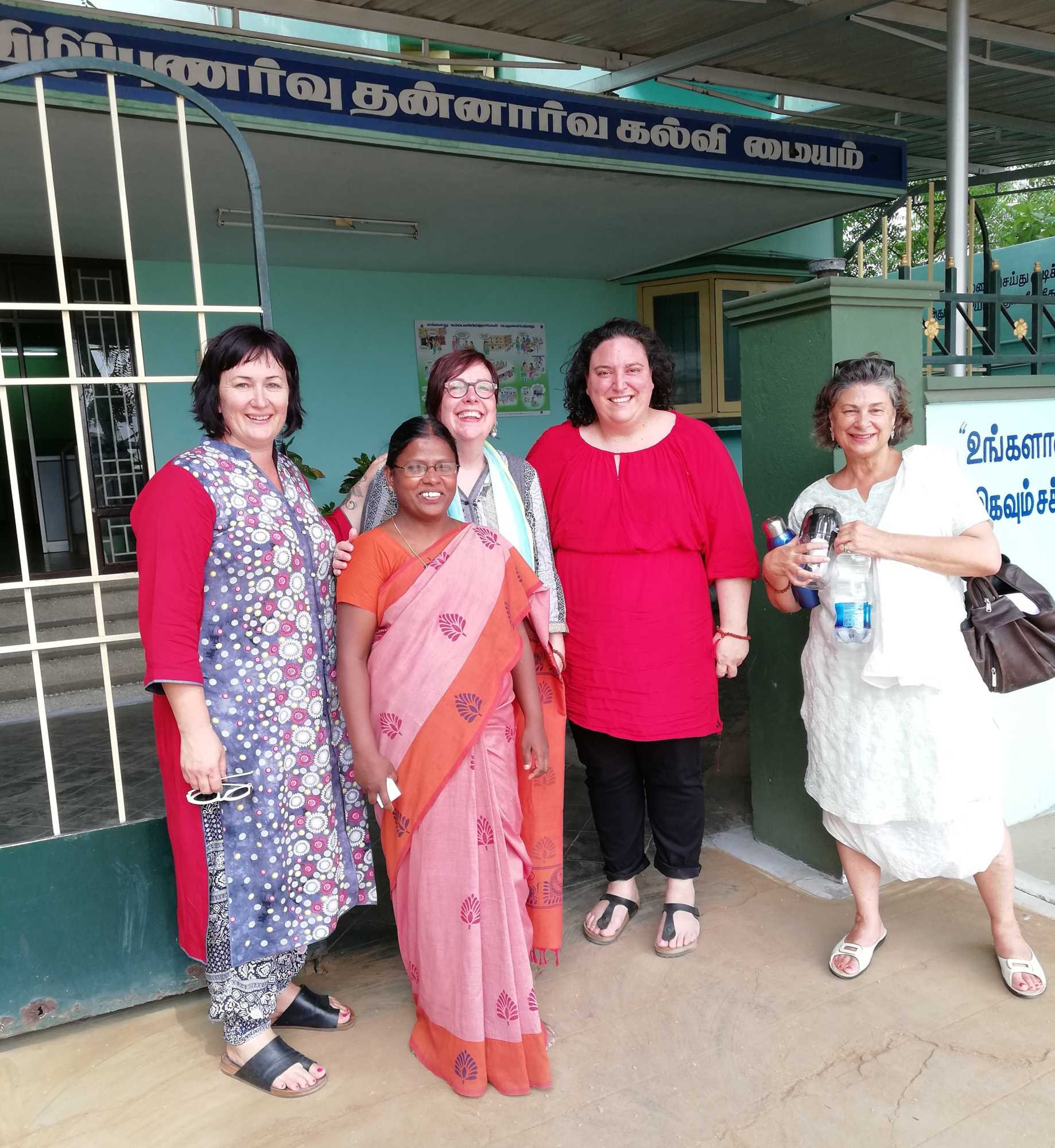
Passage to India with Kirsten Le Bon

(L-R ) Kirsten Le Bon, Mary from SAVE (Social Awareness and Voluntary Education), Sue Hannaway, Sarah Wirth and Theresa Grantham.
Teaching is about guiding our young learners to become independent individuals. It is about developing an understanding in our students, promoting an atmosphere of academic expectation and being agile and responsive to the needs of a 21st century education.
And it is also very much about our teachers as leaders and expanding their knowledge base. Teachers must themselves be lifelong learners, absorbing new information and sharing their experiences and passions.
At Iona, we encourage our colleagues to explore opportunities for learning, and to bring real-world knowledge back to the classroom.
Kirsten Le Bon, our Head of Technology, was delighted to take up such an opportunity in April, when she travelled to India with the inaugural Seed to Self Journey* to understand the effect the fast-paced fashion retail industry has on India’s growers and weavers.
Travelling alongside Sarah Wirth, from Samuel Marsden Collegiate School and the National Executive Leader at the Home Economics and Technology Teachers’ Association New Zealand (HETANZ) and Sue Hannaway, the regional rep from HETANZ and an educator at Onslow College, Kirsten was keen to experience how social, political and trading issues translate across borders. She also hoped to grow her understanding of one of the largest textile manufacturing countries in the world and the lives of the people who work within it.
“We met with cotton and silk weavers, farmers, and home workers who were working as starch applicators. They all seemed so desperate to see their children avoid the drudgery of these historical trades and instead enter the digital world, which they have been told is ‘the future’,” begins Kirsten. “Private loans are taken out in order to help fund children’s education, so that their sons and daughters can have ‘a better life’, mostly in computer engineering. It made me appreciate that those of us working in New Zealand education have the privilege of promoting ICT every day, for use in learning, working and communication.”
Kirsten is well aware of the appetite for so-called “fast fashion” both in New Zealand and across other first world countries. “This gluttony is a problem we are all responsible for,” she says.
To observe the pressure this fashion expectation puts on southern Indian farmers was a “challenging experience”. Many had lost huge amounts of money in their crops last year, forcing some to consider a switch from organic to GMO seed to keep pace with demand. “Loans have been taken by some of the farmers and these have been at a massive 50-60% interest rate for lending,” adds Kirsten.
With the fifth anniversary of the Bangladesh factory collapse that claimed more than 1000 lives taking place around the same time as Kirsten’s trip, health and safety practices were as topical as ethical and sustainable ones. “We need to outsmart yesterday’s solutions,” Gijs Spoor, Seed to Self co-ordinator told the group.
“Non-compliance with labour management practice is common in the apparel industry,” Kirsten says, “and even though working conditions have improved, the problems persist. There are countless reports of garment workers who suffer horrific accidents which could easily have been prevented by their employers. I met with courageous women who are changing lives by investing their time in educating the youth in fair trade, creating a voice for the rights of the people.”
Back on New Zealand soil, and sharing her learnings in every way possible in her Iona classroom, Kirsten is grateful to Iona College, the Board of Trustees and the PFA for supporting this teacher scholarship and investing in her professional development.
“I believe it has helped me identify issues we have here in New Zealand with regard to our agricultural industry, our manufacturing industries (or lack of) and labour costs. I can appreciate, and share with my students, some of the challenges our local farmers must face too, when producing raw materials such as merino.
“The hands-on understanding of what life is like for the farmers, makers and artisans in southern India will forever be shared with my students in their learning.”
*The Seed to Self Journey is a journey through the organic cotton regions of Southern India. Designed to help individuals and industry professionals learn the impact of the current fashion paradigm, and more importantly, the way to weave positive transformation into the fashion industry and the clothes we wear.
Article added: 22 November 2018

© Copyright 2010 - 2018, Iona College | T +64 6 877 8149 | Email office@iona.school.nz
42 Lucknow Road, Havelock North 4130, | Private Bag 1000, Havelock North 4157, New Zealand




 Admin Login
Admin Login